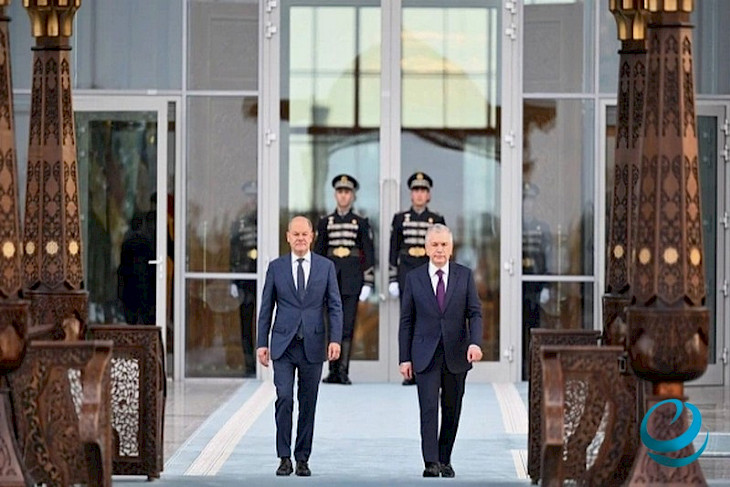The President of Uzbekistan, Shavkat Mirziyoyev, held official talks with German Chancellor Olaf Scholz in Samarkand as part of his two-day visit to Uzbekistan.
"President of Uzbekistan Shavkat Mirziyoyev welcomed Federal Chancellor Olaf Scholz, who arrived in our country on an official visit, at Registan Square," the press service of the President of Uzbekistan reported.
As part of Chancellor Scholz's visit program from September 15-16, high-level negotiations took place in Samarkand, during which issues concerning the further development of multifaceted Uzbek-German cooperation were discussed.
As part of the program, the President of Uzbekistan and the German Chancellor also held a joint meeting with business representatives from both countries.
Following the negotiations, Mirziyoyev and Scholz adopted a Joint Declaration. During the visit, eight bilateral documents were also signed:
- An intergovernmental agreement on comprehensive partnership in migration and mobility;
- An intergovernmental declaration on cooperation in veterinary and livestock sectors;
- An intergovernmental declaration on cooperation in the sustainable use of water resources under the "Green Central Asia" initiative;
- A joint declaration on cooperation in critical minerals;
- An agreement on transport cooperation;
- A memorandum of cooperation on climate change within the framework of the Paris Agreement.
Additionally, they adopted a program for technological partnership and industrial cooperation for 2024-2026, as well as signed a package of agreements and contracts at the level of leading enterprises in Uzbekistan and Germany.
Olaf Scholz's visit to Central Asia and the "CA + Germany" summit is more important for the chancellor than for his counterparts. Scholz is losing political influence at home and is facing a significant migration and economic crisis.
In Uzbekistan, he has already shown what he expects from the trip — the opportunity to deport illegal migrants through an intergovernmental agreement.
Developing the Trans-Caspian International Transport Route: Europe is still seeking someone brave enough to take on a €10 billion loan for this endeavor. Since convincing individual interested countries has not worked, they are now trying to gather them into a consortium.
Finally, just like French President Macron, German Chancellor Scholz is looking for alternatives to Russian and Chinese supplies of rare and critical minerals in Central Asia. Without a doubt, Scholz will not leave empty-handed in this regard.
The only significant intrigue of this visit is whether Germany will agree to more broadly open its market to Central Asian exports. So far, no such groundbreaking developments are expected.
After concluding his visit, Olaf Scholz will head to the capital of Kazakhstan, where he will participate in the second "Central Asia - Germany" summit. The summit has invited the leaders of all five Central Asian countries. Participants will discuss pressing regional issues, including expanding cooperation between Central Asian countries and Germany in all areas of mutual interest.
CentralasianLIGHT.org
September 16, 2024

